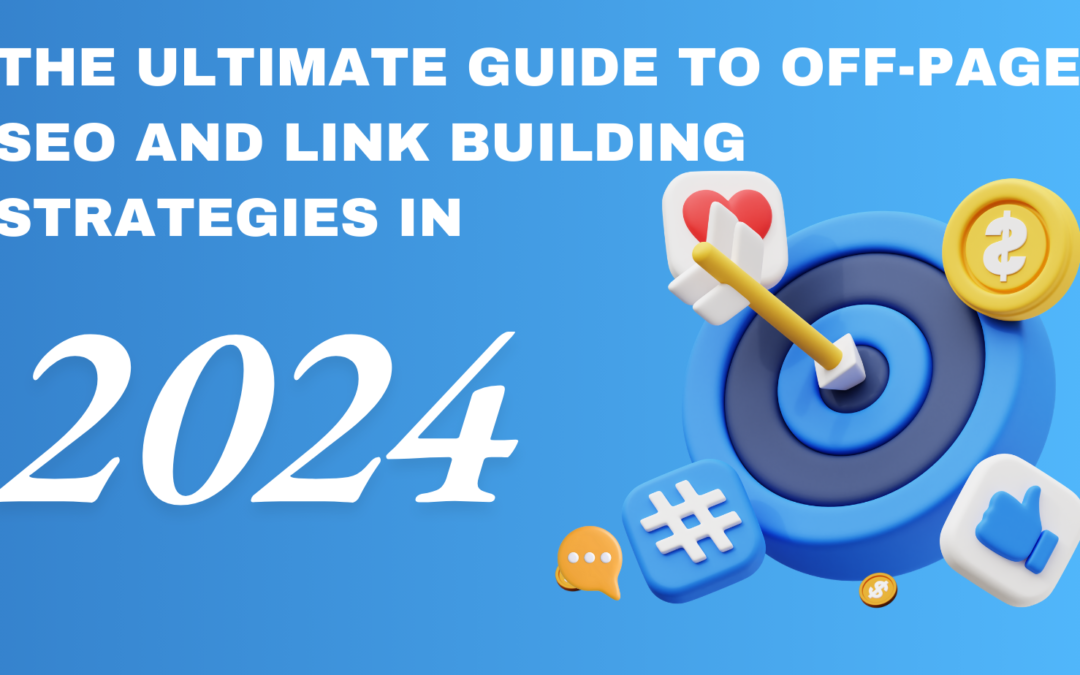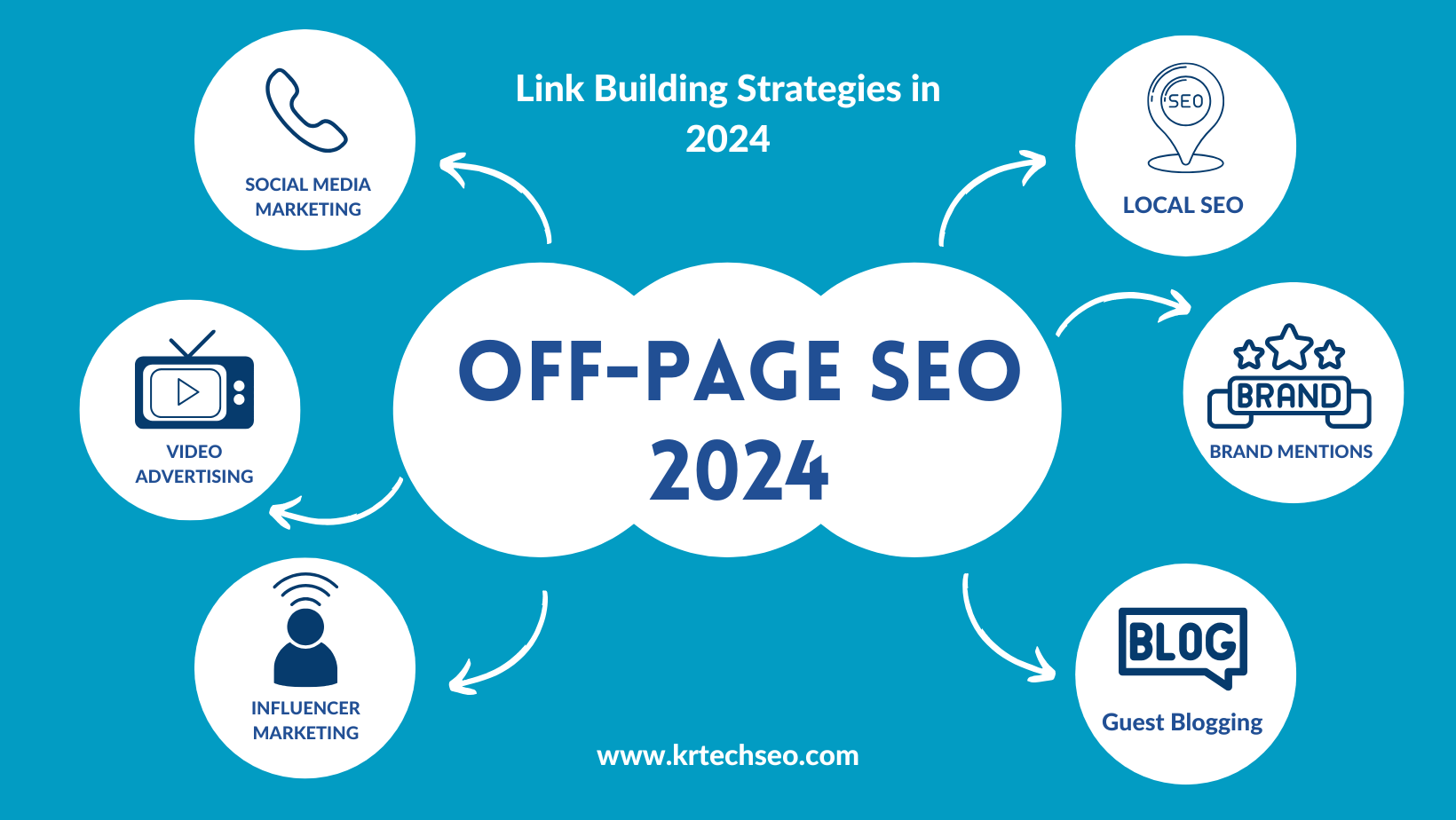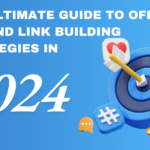Off-page SEO plays a critical role in improving your website’s search engine rankings by focusing on actions performed outside of your website. you will learn In this blog, we dive deep into the world of Off-Page SEO 🌐 and explore the best Link Building Strategies 🔗 to help your website dominate the search rankings in 2024. Whether you’re a beginner or a seasoned pro, this guide is packed with actionable tips, expert advice, and proven techniques to boost your site’s authority and traffic.
Introduction to Off-Page SEO
Off-Page SEO is the backbone of a well-rounded digital marketing strategy. It refers to all actions taken outside your website to boost your site’s ranking in search engine results. From acquiring backlinks to leveraging social media, off-page SEO is vital in improving your domain authority and driving organic traffic.
Why does it matter in 2024? Search engines like Google are constantly refining their algorithms, placing a heavier emphasis on credibility and external validation. Off-page SEO plays a crucial role by signaling trustworthiness and relevance, helping you stand out in the crowded online landscape.
Without a robust off-page SEO strategy, even the most optimized on-page content might struggle to rank high. In short, off-page SEO is your website’s “word-of-mouth” on the internet.
Key Components of Off-Page SEO
To succeed in off-page SEO, you need to focus on multiple interconnected factors. Here are the most important components:
- Link Building
The foundation of off-page SEO continues to be link building. Good backlinks act as referrals from other websites, showing search engines that your content is useful and reliable.
- Brand Mentions
Unlinked brand mentions are considered by Google as a sign of trust. Positive brand mentions on blogs, social media, and forums can increase the authority of your website.
- Social Signals
Likes, shares, and comments are examples of indirect social signals that improve exposure and interaction, which may increase your search engine rankings.
Understanding Link Building for SEO Success
What Makes a Quality Backlink?
Not all backlinks are created equal. In 2024, Google values quality over quantity. A high-quality backlink comes from an authoritative, relevant, and trustworthy site. For instance:
- The linking site’s domain authority should be high.
- The link should come from relevant content within your niche.
- Anchor text must appear natural and contextual.
Types of Backlinks
- Do-Follow Links: These pass SEO value to your site, directly improving rankings.
- No-Follow Links: While they don’t pass link juice, they drive traffic and build awareness.
- UGC Links: User-Generated Content links, often seen in forums or comments.
Top Link Building Strategies in 2024
Link building requires creativity and effort. Here are the top strategies dominating in 2024:
- Guest Blogging
Create excellent content for reputable websites in your field. Make sure the content is valuable, original, and appropriate for the target site’s audience.
- Broken Link Building
Identify broken links on relevant websites and suggest your content as a replacement. Tools like Ahrefs and SEMrush can help find these opportunities.
- Resource Page Link Building
Many websites host resource pages linking to valuable tools or articles. Reach out with your content that fits naturally into these lists.
Latest SEO Updates for 2024 and Their Impact on Off-Page Strategies
Google’s Updated Ranking Factors
In 2024, Google emphasizes three main factors:
- Relevance: Links and content must align with user intent.
- Authority: Backlinks from high-authority sites matter more than ever.
- Experience: Google’s algorithm favors user-centric and engaging content.
The Role of AI in SEO
AI tools like ChatGPT and Jasper are shaping how content is created and optimized. Off-page strategies now leverage AI for personalized outreach, data analysis, and creating link-worthy content.
The Role of Social Media in Off-Page SEO
Social media isn’t just about posting selfies or memes—it’s a powerhouse for boosting your off-page SEO strategy. With billions of users worldwide, platforms like Facebook, Twitter, Instagram, and LinkedIn offer immense potential for driving traffic, building brand authority, and attracting high-quality backlinks.
Leveraging Social Platforms for Visibility
You can increase the reach of your article by sharing it on social media. Search engines receive indications that your material is useful when users interact with, share, or comment on your postings. Here are some tips for increasing visibility:
- Optimize Profiles: Ensure your social media bios include relevant keywords and a link to your website.
- Engage Regularly: Consistent interactions with followers build credibility and keep your brand top-of-mind.
- Utilize Trending Hashtags: Use industry-specific hashtags to make your content discoverable to a broader audience.
Best Practices for Social Engagement
To succeed, your social strategy should prioritize engagement. Here are some tips:
- Respond promptly to comments and messages.
- Share user-generated content to encourage loyalty.
- Run contests or giveaways to increase interactions.
By fostering a community around your brand, you’re not just boosting social metrics—you’re also indirectly supporting your SEO efforts.
Content Marketing’s Influence on Off-Page SEO
If SEO is the vehicle, content marketing is the fuel. Creating compelling, shareable content is the cornerstone of any successful off-page SEO strategy.
Creating Link-Worthy Content
Quality content naturally attracts backlinks. Consider these formats to generate interest:
- In-Depth Guides: Comprehensive resources that cover a topic thoroughly.
- Infographics: Visual content that is easy to understand and highly shareable.
- Case Studies: Detailed accounts of real-world successes backed by data.
Importance of Visual Content
Visuals like images, videos, and infographics outperform plain text when it comes to engagement. Not only are they more likely to be shared, but they also appeal to audiences across multiple platforms. For example:
- Videos drive traffic from platforms like YouTube and TikTok.
- Memes and creative visuals gain traction on Instagram and Twitter.
A strong content marketing plan creates a ripple effect, earning organic backlinks, driving traffic, and establishing authority.
Local SEO and Citation Building
For businesses targeting a specific geographic region, local SEO is a critical part of off-page SEO.
Understanding Local Off-Page SEO
Local SEO involves optimizing your presence to attract traffic from location-based searches. This includes:
- Getting listed on Google My Business (GMB).
- Collecting positive customer reviews.
- Participating in local community events or sponsorships.
Building Local Citations Effectively
Citations are mentions of your business on the web, including your name, address, and phone number (NAP). To improve your local off-page SEO:
- List your business on local directories like Yelp, TripAdvisor, and industry-specific platforms.
- Ensure consistent NAP details across all listings.
- Partner with local bloggers or influencers for mentions.
By dominating the local search landscape, you increase your visibility among potential customers in your area.
Avoiding Common Off-Page SEO Mistakes
Even seasoned SEO professionals can fall into traps. Here’s what to avoid to keep your off-page strategy clean and effective.
Black Hat Techniques to Avoid
- Buying Links: Paid links can result in penalties if detected by Google.
- Link Farms: These are networks of low-quality websites created to exchange backlinks, which do more harm than good.
- Over-Optimized Anchor Text: Stuffing keywords in anchor text is a red flag for search engines.
Misuse of Automation
Automation tools can save time, but over-relying on them for link-building outreach can lead to spammy practices. Ensure your messages are personalized and genuine.
By steering clear of these pitfalls, you’ll protect your site from penalties and maintain a strong online reputation.
Tools for Off-Page SEO and Link Building
Having the right tools in your arsenal can significantly simplify and enhance your off-page SEO efforts.
Top Tools for Backlink Analysis
- Ahrefs: A comprehensive tool to analyze backlinks, monitor competitors, and discover link-building opportunities.
- Moz Link Explorer: Provides insights into your link profile and domain authority.
- SEMrush: Offers backlink audits and tracks new link acquisition.
Tools for Competitor Research
- BuzzSumo: Helps identify trending content in your niche, which can inspire link-worthy ideas.
- SimilarWeb: Tracks competitor traffic sources and referral links.
- Hunter.io: Assists in finding contact information for outreach campaigns.
Using these tools allows you to make data-driven decisions, giving your off-page SEO strategy a competitive edge.
Measuring the Success of Off-Page SEO
It’s essential to monitor the impact of your off-page SEO efforts to ensure you’re on the right track. By analyzing specific metrics, you can identify what works and refine strategies to achieve better results.
Key Metrics to Track
- Domain Authority (DA) and Page Authority (PA): These metrics, developed by Moz, indicate the strength of your website. A higher DA means better chances of ranking.
- Backlink Quality and Quantity: Use tools like Ahrefs or SEMrush to analyze the sources of your backlinks and ensure they come from authoritative domains.
- Referral Traffic: Check Google Analytics to see how much traffic is coming from external sites. High referral traffic indicates effective off-page SEO.
- Social Signals: Track likes, shares, and comments on your social media platforms to gauge audience engagement.
Using Analytics for Insights
Google Analytics and Search Console are invaluable for monitoring your progress. Look for patterns such as:
- Pages receiving the most backlinks.
- Keywords benefiting from off-page efforts.
- Geographic locations where your content performs well.
This data allows you to double down on successful tactics while adjusting underperforming areas.
How to Future-Proof Your Off-Page SEO Strategy
SEO is a constantly evolving field, and staying ahead of trends ensures your efforts remain effective. Here’s how to make your off-page strategy resilient for the future.
Adapting to Algorithm Updates
Search engines frequently tweak their algorithms to prioritize user experience and relevant content. To stay ahead:
- Focus on building relationships rather than just acquiring links.
- Regularly audit your backlink profile to remove toxic links.
- Stay updated with Google’s Search Central Blog for the latest changes.
Embracing Emerging Technologies
AI, voice search, and augmented reality (AR) are transforming how users interact with the web. To stay relevant:
- Optimize content for voice search queries by using natural language.
- Leverage AI tools to analyze trends and create personalized experiences.
- Explore AR features for enhanced user engagement in e-commerce or travel niches.
By integrating flexibility into your strategy, you can adapt to the changing landscape and maintain your competitive edge.
Building Authority Through Online Communities
Online communities are gold mines for off-page SEO. They help you connect with your target audience while building authority and trust.
Forums, Groups, and Niche Platforms
- Quora and Reddit: Answering questions and participating in discussions can position you as an expert in your field.
- Industry-Specific Forums: Engage in conversations and subtly mention your resources when relevant.
- Facebook Groups and LinkedIn Communities: These platforms are perfect for building connections and sharing insights.
Tips for Genuine Engagement
- Avoid spamming links. Focus on providing value through meaningful contributions.
- Use a conversational tone to foster a sense of community.
- Share your expertise without being overly promotional.
This approach not only improves visibility but also strengthens your reputation in your niche.
The Importance of E-A-T in Off-Page SEO
E-A-T (Expertise, Authority, Trust) has become a critical component of Google’s evaluation process. Establishing these qualities can significantly enhance your off-page efforts.
What is E-A-T?
- Expertise: Demonstrates your deep understanding of the subject matter.
- Authority: Establishes your website or brand as a trusted leader in your field.
- Trust: Ensures reliability and credibility.
Building Trust Through Off-Page Efforts
- Collaborate with Influencers: Partnering with respected voices in your niche amplifies your authority.
- Secure Mentions from Reputable Websites: High-authority backlinks signal trustworthiness to search engines.
- Encourage Reviews and Testimonials: Positive feedback from customers or clients boosts trust in your brand.
By aligning your off-page SEO strategy with E-A-T principles, you can meet Google’s expectations and outperform competitors.
Conclusion
Off-page SEO in 2024 revolves around building meaningful connections, creating valuable content, and leveraging emerging trends to stay ahead. From link building to social media engagement, every tactic contributes to your website’s visibility and credibility.
As search engines continue to evolve, focusing on quality over quantity remains the golden rule. Stay adaptable, keep experimenting, and prioritize user satisfaction to ensure your off-page SEO strategy thrives in the ever-changing digital landscape.
FAQs
- What is the difference between on-page and off-page SEO?
On-page SEO focuses on optimizing elements within your website, such as content, meta tags, and images. Off-page SEO involves activities outside your site, like link building, social media marketing, and brand mentions, to boost your online reputation.
- How can I build high-quality backlinks?
High-quality backlinks come from authoritative and relevant websites. Strategies include guest blogging, creating shareable content, and leveraging broken link opportunities.
- Is social media important for off-page SEO?
Yes, social media plays a significant role in off-page SEO. It helps drive traffic, increase brand awareness, and indirectly influence search engine rankings through social signals.
- How do I measure the success of off-page SEO?
Use tools like Google Analytics, Ahrefs, or SEMrush to track metrics such as domain authority, referral traffic, backlink quality, and social engagement.
- What are some common off-page SEO mistakes to avoid?
Avoid black hat tactics like buying links, overusing anchor text, and participating in link farms. Always prioritize ethical and organic strategies for long-term success.







